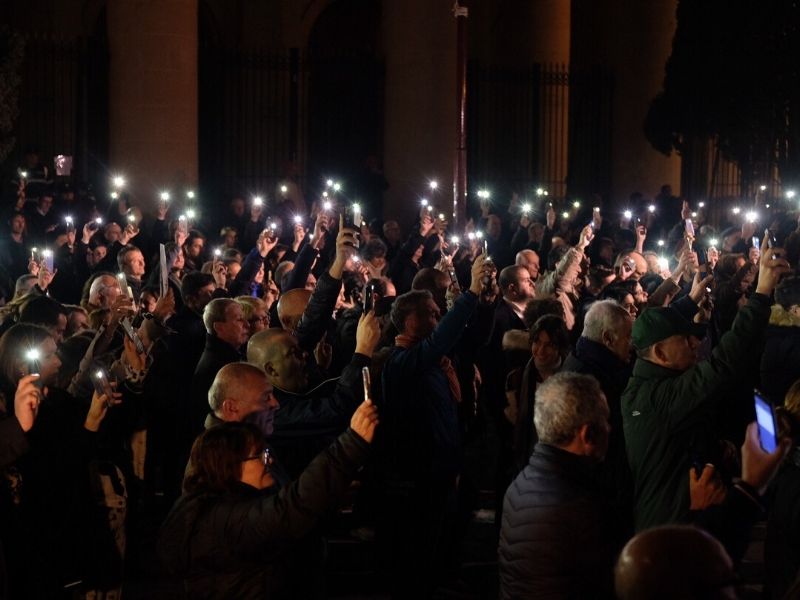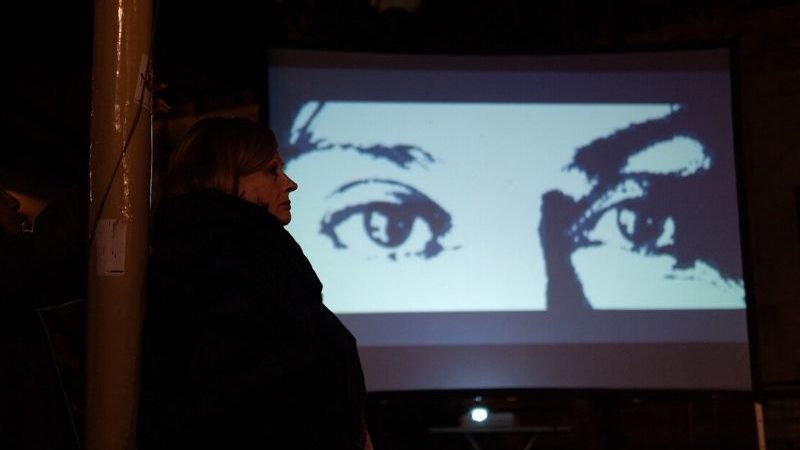The protests would not stop until concrete action was taken against those who failed to do their duty and those who were involved in the assassination of journalist Daphne Caruana Galizia.
Marion Pace Asciak, from civil organisation Repubblika, told crowd attending the vigil marking the 27th month anniversary since the assassination of Caruana Galizia, that they would continue the fight for justice to ensure that all those who were, directly or indirectly, involved in her death faced the consequence of their actions.
“Keith Schembri still has many questions he needs to answer. Joseph Muscat continued to protect and defend him, irrespective of the facts he had for months,” she said.
The same could be said for former ministers Konrad Mizzi and Chris Cardona and Finance Minister Edward Scicluna who were “clearly involved” in shady transactions.
“Muscat had to resign and did so through the great work carried out by Daphne. Even though they killed her, her words still echo and condition our politics till this day,” Pace Asciak said.
It was “a great satisfaction” that Robert Abela agreed with Repubblika’s principles of good governance and “we are looking forward to seeing that he implements what he promised,” she added.
The vigil, which is held on the 16th of every month, was organised by civil society organisations Occupy Justice and Repubblika and held in front of the protest memorial that marks the Great Siege in Valletta.
Earlier in the day, Abela said the protest memorial would not be cleared from the flowers and candles once the vigil was over. This marks a change from the previous administration under Joseph Muscat where the items would be removed by government employees in the dead of night.
Repubblika was also waiting for Abela to fulfil his promise to remove Police Commissioner Lawrence Cutajar and reply to the 20 questions they put forward on behalf of civil society. Abela had a duty to answer questions related to the Electrogas power station deal, the Vitals contract and transfer of public land to DB Group, Pace Asciak said.
Civil society would not give up until clear replies were given on these and other matters. “We will not allow anything to distract us or affect our work,” she said.
Repubblika would continue to demand that Malta had rule of law, justice and politicians who had a backbone and stood up for anything that would hinder democracy.

The crowd lights up the night with their mobile phones. Photo: Joanna Demarco
She also thanked and gave praise to Simon Busuttil, who was recently given the prestigious role of secretary general within the European People’s Party. “Above all, I want to praise his courage and determination which, after seven years of vilification, remained there throughout together with his principles of good governance, rule of law, justice and clean politics”.
These principles were the same on which Caruana Galizia had based her journalism and on which civil society was reacting to the corruption that was eating away at society, Pace Asciak said.
Activist Jeremy Gingell told the crowd change was not a given with a new prime minister. “In the absence of a credible opposition, it has to be us that keeps on struggling for justice and truth and be the guardians of our democracy,” he said. “We can’t turn back time, but we have the duty to do everything in our power to fix what doesn’t work,” he added.
Gingell described Muscat’s legacy as one of “impunity” and of an “everything goes” attitude and that is how he was going to be remembered.
“In a corrupt state the first thing to suffer is the environment,” Gingell said. “We are seeing this continuously. Just look at what is happening in Attard,” he said referring to the Central Link project.
He went on to explain that what happens next is a “vicious cycle”, where the destruction of the environment affects people’s health and that, in turn, affects how people function at home and work. “A corrupt country isn’t strong,” he said. “A corrupt country is a sick country”.
Gingell thanked investigative journalists for their resilience. “Journalists gave us the courage to keep on taking to the streets and fighting against those injustices,” he said.
He also referred to young people who were “essential” for the continued fight for justice and for “what is right”.













